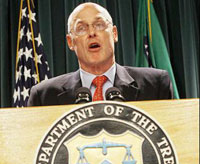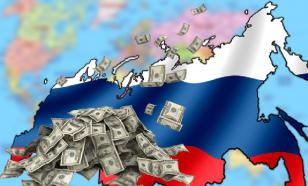China needs to be open to trade and competition, Paulson
US Treasury Secretary Henry Paulson reiterated his support for a strong dollar Thursday, in a speech that also called on China to show more exchange-rate flexibility and speed up its economic reforms.

Paulson repeated his position that markets should set the dollar's value and urged China's government to allow the yuan to appreciate, saying it would help Beijing keep inflation in check while maintaining stable growth.
"A strong dollar is in our nation's interest and again the currency value should be determined competitively based upon our economic fundamentals," Paulson told Chinese and US business leaders gathered in New York.
He said that while the US economy was experiencing a crunch in the credit and housing markets, the underlying health of the US economy would carry the United States through the current rocky phase.
"I've been pretty clear in acknowledging that we're going through some turbulence in our capital markets. Risk is being reassessed, it's being re-priced and it's going to take just a while to work through that.
"But we're working through it against a healthy economy, a very strong global economy and a very healthy US economy. I believe we are going to continue to grow, to work our way through that because of the strength of our economy," he said.
He was speaking after the dollar slipped slightly in New York following comments by Federal Reserve chairman Ben Bernanke painting a bleak picture of the US economy, caught between dual threats of mounting inflation and slower growth.
In a speech that focused mostly on the pace of Chinese reforms, Paulson said that while some in Beijing feared moving too quickly, "I believe moving too slowly is a bigger risk for Chinese and world prosperity."
"China needs more flexible prices including a much more flexible market-driven exchange rate," he told the China Institute Executive Summit.
"Exchange rate flexibility is also key to allowing monetary policy -- the most potent instrument for guiding an economy -- to focus on assuring stable and non-inflationary growth."
Paulson, who has visited China several times during his tenure as treasury secretary, said that China needed to do much more to better integrate with the rest of the global economy.
"Further openness to trade and competition is clearly in China's interest."
"The renminbi (yuan) exchange rate is increasingly being viewed by many countries as a source of unfair competition. China is increasingly seen as out of step with international norms and expectations," he said.
China in 2005 ended the fixed peg of the yuan to the dollar by allowing it to float within a relatively narrow range. But many leaders in the United States and Europe have urged China to move faster, AFP reports.
China's record trade imbalance with the U.S. has prompted calls from American lawmakers to take a harder line on the currency. The Senate Finance Committee in July approved legislation aimed at pushing China to let the yuan trade more freely.
Paulson said that unless China acts to liberalize its markets, trade friction will rise.
“Frankly, it is easier to keep the U.S. economy open if the American public sees China continuing to open their markets,'' he said. ``By joining efforts, we will be more effective in working against this protectionist tide. Balanced growth -- growth that does not generate large trade imbalances - - is vital to each of our country's prosperities and to sustained global growth.''
Paulson touched on growing consumer concern about Chinese- made products, amid revelations this year of toxic pet food and lead paint on goods imported from China.
Next month, Paulson will make his fifth trip to China since becoming Treasury chief in July 2006. He said the SED talks have improved the U.S. government's ability “to certify the safety of food and product imports coming from China.”
The secretary also said the two countries must share responsibility in protecting the environment. China's air and water quality is among the worst in the world as economic growth strains its resources, according to a report by the Organization for Economic Cooperation and Development in July, Bloomberg reports.
“China's acute environmental problems are degrading the health of its population and ecosystems as well as undermining China's long-term economic potential,'' he said. “A healthy environment and a strong economy are not mutually exclusive; they are mutually necessary.”
Source: agencies
Subscribe to Pravda.Ru Telegram channel, Facebook, RSS!



